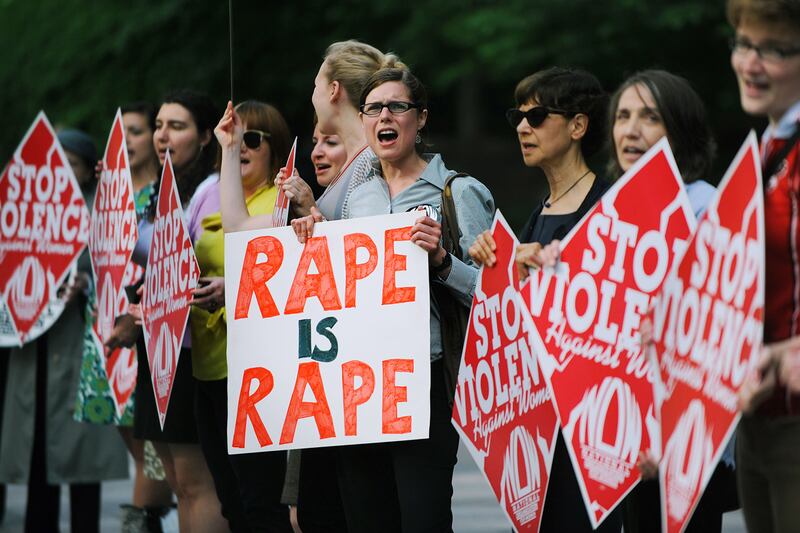Republican men seem to find themselves in a colossal mess with female voters about once a week these days. So cue a group of female senators—Democratic and Republican—who went to the Senate floor Thursday to register their disbelief that serious opposition exists among, yes Republican men, to updating the Violence Against Women Act, the 1994 bill that provides money for emergency shelters, counseling, rape crisis centers, and legal services for victims of sexual assault, domestic violence and stalking.

“It’s hard to believe we are having a conversation in 2012 about protecting women from violence, but we are,” said Sen. Barbara Boxer, the California Democrat.
Seven years ago, the bill passed the House 415 to 4 and then cruised through the Senate unanimously. Last month, a new version of the bill passed the Judiciary Committee, but only after all eight Republicans on the panel, all men, voted against it.
“I was stunned by the vote,” said Sen. Dianne Feinstein (D-Calif.), who sits on the committee. “Never before had there been any controversy in all of this time about this bill.”
The vote also stunned women’s groups, used to seeing the bill sail through Congress, and Democratic operatives, who have watched with delight as national Republicans have pushed bills to limit insurance coverage for women’s contraception, local Republicans have passed laws forcing women to undergo an invasive ultrasound before having an abortion, and Republican favorite Rush Limbaugh called a Georgetown law student a slut and a prostitute after she testified to Congress about access to contraception.
With Republican senators opposing a bill designed to protect women from abuse and stalking, Democratic leaders smell blood in the water and are pushing for a vote on the legislation as early as next week.
Although the bill has 58 co-sponsors, including all 17 women—Democrats and Republicans—in the Senate, it is two votes short of a 60-vote margin that would guarantee passage. Getting two more Republicans on board should be easy enough, especially under the political circumstances. But the new version of the bill has several controversial provisions, including language to include gay and lesbian couples, as well as illegal immigrants in the bill’s protections, which could make it impossible for some Republicans to vote for the bill, even if they support its goals.
Feinstein said the new provisions should not be seen as political. “Domestic violence is domestic violence. If the victim is in a same-sex relationship, is the violence any less real, is the danger any less real because you happen to be gay or lesbian? I don’t think so,” she said. “If a family comes to the country illegally and the husband beats his wife to a bloody pulp, do we say to the victim, well you’re illegal, I’m sorry you don’t deserve any protection?”
Feinstein and the Democrats say the changes just make sense, but conservatives are sounding alarm bells that they’re on the wrong end of an election-year stunt.
“I think it designed to fit in with the narrative that there is a war against women, when nothing could be further from the truth,” said Janice Crouse, of the Concerned Women for America. Crouse signed a letter from a coalition of 23 conservative groups opposing the bill, which they called “nice-sounding but deceitful because it destroys the family by obscuring real violence to advance the feminist agenda.”
“If you follow the money, this bill is a boondoggle for feminist organizations,” she said, pointing to funding for social-work organizations and programs that provide counseling and training services. More broadly, “It has created a climate where all men are suspect and all women are considered victims.”
The top Republican on the committee, Sen. Charles Grassley, said he supports the bill in concept, but outlined a number of problems he sees in the Democrats’ version, including a change to immigration law that he said would open the gates to visa fraud if an undocumented immigrant could get an American visa by claiming to be a victim of domestic violence.
“In the end, Senator Grassley will not support legislation that drastically expands and alters the original intent of the law, and fails to address several fundamental problems,” his spokeswoman said.
Grassley’s objections are detailed and substantive, two qualities that don’t work well in a political season that has seen GOP super PAC donor Foster Friess joke that women should put aspirin between their knees to keep from getting pregnant, while Rick Santorum has had to defend past statements that contraception is “not OK.”
On Thursday, Sen. Kay Hagan, Democrat of North Carolina, said Republican opposition to the Violence Against Women Act amounts to nothing more than “petty partisanship and gamesmanship,” but Feinstein said she thinks it could be something deeper, and far worse.
“I hope that this bill is not part of a march over the last 20 years to cut back on rights and services to women, and I mean that most sincerely,” she said. “I have never seen anything like this.”






